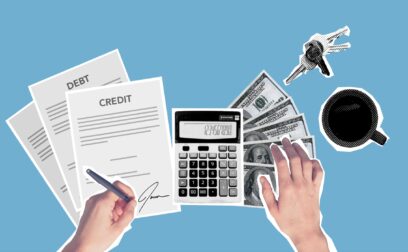Getting a business loan with bad credit can be more difficult, but it’s certainly not impossible. This guide takes you through your options so that you can find a solution that works for you and your business.
What is considered bad credit?
Bad credit usually means you or your business hasn’t managed credit well in the past and as a result, your credit score will be low.
A credit history exists for anyone or any business that has taken out credit, such as a loan or credit card, in the past. However, if you were late with payments or you were unable to repay your loan or credit card debt in full, this will have had a negative impact on your credit score.
Similarly, if you’ve exceeded your credit limit or you’ve been declared bankrupt in the past, this will also have dragged your credit score down. As a result, lenders will now view you as higher risk and might not be so willing to let you borrow money.
Note that if your business is just starting out and has never borrowed before, it won’t have built up a credit history yet which means that lenders have no way of knowing how responsible you are as a borrower. This isn’t the same as having ‘bad credit’, but it can still be trickier to get accepted for loans. Some lenders might look at your personal credit score instead of your business score to give them an idea of how creditworthy you are.
Can you get a business loan with bad credit?
Yes, you can get a business loan with bad credit, but you’ll have fewer lenders to choose from. Because you’ll be viewed as higher risk, many lenders could simply refuse to offer you a business loan.
However, certain business loans are designed specifically for those with bad credit, so if you’ve struggled to get a standard business loan, these are worth exploring. They are often known as bad credit business loans.
How do I find bad credit business loan providers?
You can find bad credit business loans through specialist loan companies online, but some high street banks will also offer loans for those with lower credit scores.
Before applying for a bad credit business loan, it can be worth consulting your accountant or an independent financial adviser to make sure you understand the full cost of the loan and the impact it will have on your cashflow. Make sure you understand how much interest you will be paying, the length of the term and the amount you will need to pay back each month. Carefully consider whether your monthly repayments will be affordable.
It’s important not to apply for a lot of business loans in a short space of time. That’s because each time you apply, a hard credit check is carried out which leaves a mark on your credit report. Lenders can see this and it could suggest to them that you are desperate for credit, which could lead to rejections.
If you’ve been turned down for a loan, before applying again, it’s worth checking your business credit score – we’ve teamed up with Credit Passport so that you can do this for free. You can also take steps to improve your credit score such as correcting any errors you spot on your credit report – this could be as simple as an incorrect business name or address.
Paying bills and invoices on time can also help to boost your credit score, as can filing your company accounts on time and keeping your credit utilisation at 25% or below. Your credit utilisation is how much of your available credit limit you use. So if you have a credit limit of R20,000 and you have used R10,000 of that, your credit utilisation will be 50%.
Are the costs for a bad credit business loan higher?
Yes, the interest rate on a bad credit business loan will usually be considerably higher compared to a standard business loan. There might also be fees for early repayment and late payment, so make sure you check.
Do bad credit loans take longer to receive funds?
It can take a little longer to receive funds with a bad credit business loan, but this will depend on the type of loan you’re applying for. Make sure you complete the application form honestly and fully to ensure there are no unnecessary delays.
What added security is required to secure a bad credit business loan?
Some business loans might require you (and all owners with a stake of 20% or more in the business) to sign a personal guarantee. This means that you will be personally responsible for paying off all or part of the loan if your business is unable to. You will usually find that this will be capped at an agreed amount.
Another option is to look at secured loans. These can be an option if you have assets such as commercial property, vehicles or machinery, as you can secure the amount borrowed against one of these assets. Should you default on the loan, the lender can take possession of the asset. This reduces the lender’s risk which means that interest rates for secured loans are often lower.
You could also consider a guarantor unsecured loan. These loans require a nominated individual or business to agree to repay the loan if you are unable to. Because of this added security, loan rates can be lower.
Peer-to-peer loans are another option. Here, a number of private investors provide a business loan to your business through an online platform. Rates are often more competitive than those offered by banks.
Finally, if you have no luck with a business loan, consider using a business credit card for bad credit. This can help you to improve your credit score over time, provided you use it sensibly. Just be aware that the amount you can borrow will be a lot lower compared to a business loan and interest rates can be high if you don’t clear your balance each month.
Get started with Swoop
At Swoop we offer independent business loan comparison tables so you can easily compare which business loan will work for you. You’ll be able to compare interest rates, fees and term lengths to ensure you find the right loan for your circumstances.
Register with Swoop to find the best loan for your business needs and let us guide you through the application process.







 yet? Register here!
yet? Register here!